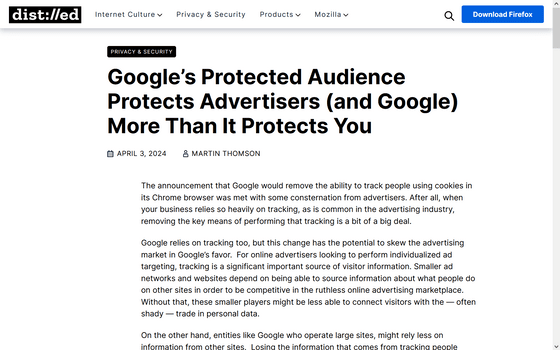Google's recommended tracking protection feature ``Protected Audience'' is ``challenging but dangerous because of unresolved privacy concerns,'' Firefox developer Mozilla says.

Google is trying to improve its system for tracking user behavior and displaying ads tailored to users, and in July 2023, it announced several improvements to display ads tailored to users' preferences while protecting user privacy.
Protected Audience Privacy Analysis - protected-audience.pdf
(PDF file) https://mozilla.github.io/ppa-docs/protected-audience.pdf
Google's Protected Audience Protects Advertisers (and Google) More Than It Protects You
https://blog.mozilla.org/en/privacy-security/googles-protected-audience-protects-advertisers/

Protected Audience is a mechanism that stores the user's behavior history in the browser, does not leak it to the outside world, and performs the ad display process called 'bidding' within the browser. This is said to maintain user anonymity compared to traditional ad distribution, which exchanges cookies between the ad distribution side and the browser.
Mozilla, the developer behind Firefox, said: ``We believe we can trust Google's claims about the impact Protected Audience will have on advertising competition.'' However, this proposal fails to achieve its privacy goals: Protected Audience's technical privacy measures do not prevent sites from abusing the API to track user behavior. ``While Protected Audience is very ambitious and offers benefits for both users and advertisers, he noted that privacy concerns are unlikely to improve over time.

The ideal of Protected Audience is to process data without exposing it to the outside world. However, Mozilla says that because Protected Audience is a complex design, it is expected that there will be some holes.
In particular, mechanisms that prevent websites from seeing information processed by browsers make it extremely difficult for advertisers to serve ads. In response to concerns from these advertising companies, Google relaxed its privacy protection, but this has made the privacy protection function even looser. Mozilla pointed out, ``Google is faced with the dilemma of whether to prioritize user protection or make concessions to advertisers.''

While many of the risks of data breaches are temporary and Google will remediate risks created by making it easier for advertisers to use, Mozilla says it has 'fundamentally complex and difficult-to-address design weaknesses'. 'There are several, and for some of them we don't know of viable solutions.' He warned that deploying Protected Audience without even a general strategy to address these weaknesses is 'very risky.'
Additionally, unlike the advertising industry, which relies heavily on tracking, Google is able to use information collected from its own services, which Mozilla believes will further solidify its dominance in the online advertising market. 'I will.'
Related Posts:
in Web Service, Posted by log1p_kr






